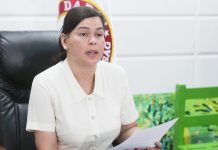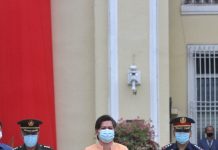by Lorie Ann A. Cascaro
As of Thursday (May 12), 80 out of 182 barangays in Davao City had set up barangay solid waste management committees and orientation seminars, according to the city environment and natural resources office (Cenro) officer in charge, Joseph Dominic Felizarta.
There will be no segregated mobile garbage bins at collection points in the city with the implementing rules and regulations (IRR) of City Ordinance No. 0361-10 Series of 2009 or the Davao City Ecological Solid Waste Management Ordinance of 2009. Only residual and special wastes shall be collected by Cenro from barangay collection points.
Felizarta earlier said that segregation at source shall be fully implemented by June this year.
Segregation at source refers to “a solid waste management practice of separating, at the point of origin, different materials found in solid waste in order to promote recycling and re-use of resources and to reduce the volume of waste for collection and disposal.”
“No need for segregated collection sa collection point kay residual and special waste na lang ang ilabay sa (sanitary landfill),” he told reporters.
Household wastes shall be segregated into biodegradable, recyclable, residual and special wastes categories.
This means that households shall practice backyard composting for biodegradable wastes, which comprise 62% of the total wastes collected in the city, and they are only allowed to dispose residual and special wastes to mobile garbage bins at collection points.
Segregated recyclable wastes must be properly cleaned before being stored in a Material Recovery Facility (MRF), as stated in the IRR.
However, biodegradable solid wastes from those who are situated in the city proper where composting facility is not possible to put up will be collected by Cenro. These will be disposed to the city’s composting facilities located at the slaughter house in Maa, and sanitary landfill in New Carmen. Both can cater two truckloads a day, Felizarta said.
This also applies to biodegradable waste from government owned markets and slaughterhouses.
Establishments that have to undertake composting of biodegradable waste generated at source are: agro-industrial establishments; farms and plantations; schools; hospitals, lying-inns, medical laboratories and clinic; dressing plants; private markets; hotels, motels, inns, boarding and lodging houses, apartelles, resorts, spas; condominiums; convenience stores; malls and arcades; food establishments; airports, seaports, wharfs; funeral homes; public and private cemeteries;
Also, included are tonsorial establishments such as barber shops, beauty and massage parlors and the like; and, amusement establishments such as cocktail lounges, bars, KTV/videoke bars and the like.
Fines, imprisonment
There will be a strict implementation of “segregation at source” as administrative fines shall be imposed on those who will violate the ordinance such that the violator shall pay P300 and attend mandatory seminar during his or her first offense.
Felizarta cited that if a violator evades the sanction, up to his or her fourth offense, a case will be filed against the person. He or she may be imprisoned for six months, according to the ordinance.
Chairman of the Association of Barangay Captains, Paolo Z. Duterte, told Edge Davao that solid wastes that are not segregated will not be collected by Cenro. “Manimaho ilang balay sa basura kung dili sila motuman,” he said.
Further, Duterte mentioned that the role of barangay captains is to inform the community about the proper solid waste management as mandated by the ordinance, but they do not have the capacity to reprimand nor apprehend those who will not comply.
“Responsibility sa barangay ang info dissemination,” Felizarta said, adding that information and education campaign (IEC) by Cenro has three teams catering to the districts in Davao City. He added that they have been distributing handbills in the communities to help inform the public.
Lesser
The city collected 480 tons a day of waste before, but, Felizarta said, “431 tons na lang karon. Every month nagababa.” He added that this has been due to backyard composting, segregation at source and recycling.
As of last December, the Cenro had collected P600,000 from tipping fees, which are charged to those bulk wastes disposed to the sanitary landfill pegged at P1,000 per ton; and, P100,000 from special waste collections.






